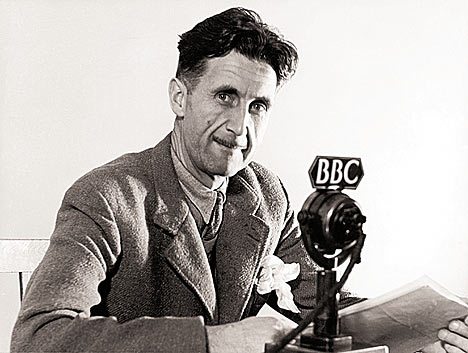I cannot think of anything more ironic than the content of the article published in The Guardian on November 7th : “George Orwell returns to loom over BBC” stating that an Orwell statue has been unveiled at the BBC’s studio piazza in London this week. Apparently, the work of art has been erected in such a way that the author of Animal Farm stands various feet from the ground overlooking passers-by. I say ironic, because Orwell was anything but the complying, non-critical , automated employee that today’s corporations demand. It is of no surprise therefore, that the project for the statue “was rejected by the BBC, reputedly because they didn’t want to celebrate one of their more contrarian former employees” 1
In another article written by the creator of the George Orwell statue himself (Orwell Statue unveiled, BBC blog, 7/11/2017) , Martin Jennings states: “There could not be a more appropriate time to erect a statue of George Orwell in central London.” I couldn’t agree more. But why? According to the sculptor, Orwell “anatomised totalitarianism and the misuse of language for political ends…” It seems almost unreal that Orwell has been reborn just as totalitarianism with all its implications : hate crime, political correctness, sexual harassment in the headlines as a vital source of news, ongoing wars in the realm of the absurd, media disinformation and confusion is spreading all over the globe like an invisible monster. It is of the utmost irony also, that the statue should be placed close to a dark recording studio that inspired Room 101 in Orwell’s dystopian novel 1984. As Maev Kennedy puts it “the basement torture chamber where each victim encounters the worst thing in the world.” 2 Has Orwell come back to warn us -the citizens of every city in the world- that the idea of Big Brother and the time for relentless personal screening might not be too far off into the future?
- “Orwell Statue unveiled” by Matin Jennings, www.bbc.co.uk , 7 November 2017
- “George Orwell returns to loom over BBC” by Maev Kennedy, The Guardian, 7 November 2017






